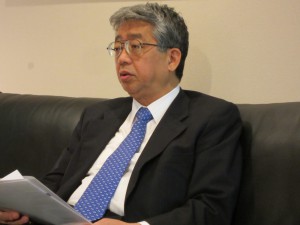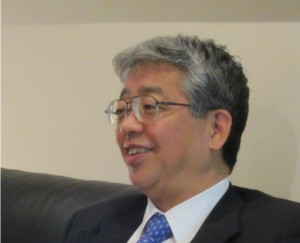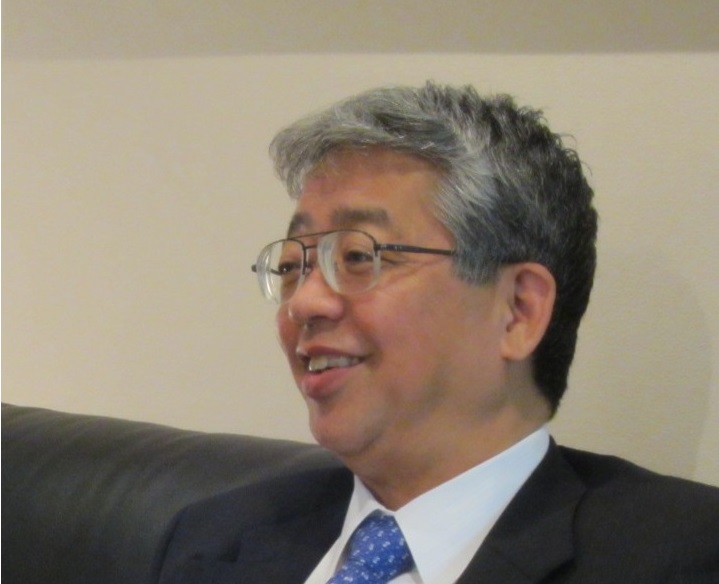“Improving Global Understanding of Trends in Japanese Politics, Economics and Society” Joji Harano, Nippon.com Representative Director
My Opinion 7
Mr. Joji Harano, Nippon.com Representative Director
Having worked as a political reporter for Jiji Press, a Paris correspondent, a commentator, and as representative director of Nippon.com’s predecessor Japan Echo, Mr. Joji Harano has been transmitting Japanese news to the world for over 40 years. We interviewed him about his thoughts on the subject.

–What is the purpose of transmitting news overseas?
It is vital, like a person’s skin. Skin is very permeable, passing water and air back and forth. It is the most important external organ. I believe that transmitting news overseas is the same thing.
–Nippon.com is transmitting information both within Japan and worldwide.
It has only been three years since we started the multilingual site, but we are already operating in Japanese and the six official languages of the UN, for a total of seven languages. Multilingualism is one of the greatest features of the Internet. We get around one million page views per month on our homepage, but if you include other outlets such as Yahoo, Facebook and YouTube the total is around two million page views. I believe we are the only ones working to this extent both in the private sector and in multiple languages, so it certainly feels worthwhile and important. Our goal for the future is to have around 70% of readers of our site be from overseas.
Increasing Understanding of Japan
–Why are you transmitting information in multiple languages?
By transmitting in the six official languages of the UN, we can cover about 70% of the global population. The job requires perseverance and politeness, but considering the future of society it is clear that mutual interdependence will continue to increase, so it is important to address the world and say what must be said. In order to do so, information must be continually transmitted overseas in multiple languages. In the future I would like to see Nippon.com try languages other than the official UN languages, similar to how multilingual nations such as India and Indonesia are transmitting information in the minority languages of their countries.
–Doesn’t the time it takes for translation place limitations on the information transmitted in multiple languages?
In order to make sure that the time taken translating does not make the information too out of date, we have to research subjects carefully and in depth. Although I believe it is important to transmit information quickly over Facebook, speed alone isn’t sufficient for understanding other cultures. Content that has not been carefully considered, designed and edited is hardly content at all. I believe it is important for people involved in transmitting information overseas to think of content as a critical component for mutual understanding when preparing it. If you write something inaccurate or worthless, you will lose readers’ trust and they will never come back again.
–What do you focus on when creating content?
Much like journalism, it is vital that there is a diversity of content with balanced viewpoints. We ignore the extreme right and left and select our content from the center, but there is still a right and a left in the center, so we try to maintain balance in displaying that. Since we cannot show everything at once, achieving balance in the long term over the course of months and years is an extremely important point. Another factor is fairness and justice. This is a complicated issue, but it is important when transmitting information. I believe it is also important for how people live their lives. It is also important to maintain independence and avoid pandering to an audience when making content. I believe it is only when releasing balanced, original content that international trust can be gained.
Transmitting Information Overseas Important for Self-Knowledge
–You have people of various nationalities on staff.
We are transmitting a life-size image of Japan, but we have been slowly shifting from having only Japanese people writing to having native speakers of other languages writing as well. People have a variety of interests, and instead of just writing entertaining pieces, I would like to include some intelligence. Newspapers used to be full of knowledge, but now they are full of only information, with a noticeable lack of knowledge and intelligence. Instead of simply releasing information onto the Internet and having the information you saw yesterday vanish as a kind of information for consumption, I would like to release useful information that people remember.
–What content that you released had a particularly large reaction?
In addition to politics and the economy, there is a lot of interest in Japan’s shift to a super-aged society. There is also a lot of foreign interest in education and welfare, with people interested in the nature of Japanese society. Looking at the access log, it is clear these types of content are being read carefully. Things representing Japan’s long history, such as religion and the Imperial family, also get a large number of views. One piece that had an extraordinary number of views was about Tokyo Camii, the largest mosque in Asia. People were very interested in it, surprised that there were mosques in Japan.
–Social networking services have changed how information is transmitted.
Recently, with Ukraine and the Arab Spring, Facebook was used to spread information. Having professionals handle diplomacy and the transmission of information overseas is no longer sufficient for global demand, and cannot resolve frustrations. Listening to the people is going to become more important than ever. I believe that in the times we live in, it is important to gain trust when transmitting information over the Internet.
Maintaining Balance while Transmitting Information
–What difficulties are there in running a website?
There are some instances where foreign sites have blatantly plagiarized our content and posted it as their own. These kinds of issues are dealt with by our lawyers. On the other hand, this does show how little content there is available written about Japan in multiple languages.
–Do you have any tips for maintaining a website in the long run?
The most important thing is securing manpower and resources. I compared transmitting information overseas to skin, so it is important to maintain healthy skin that can continue to breathe. Situations are constantly evolving, so I don’t believe it is possible to make something perfect. But we will try to make up for that with creativity and intelligence.
–How would you like to develop the site in the future?
Although we have rules about not using the site for defamation or personal advertisements, I believe it is necessary to make more explicit rules about separating the private from the public and about how to avoid tarnishing the site’s reputation. I also want to make sure we are not confused with advocacy journalism. I would not appreciate our site being accused of simply being a cat’s-paw for the Japanese government under the guise of transmitting information overseas. The content we have released can change significantly depending on the situation, so although it is rare on the Internet, I would like to make sure we keep our content up to date. We receive grants, and in no way is our future assured. Our current plan is to find similar civilian organizations to work together with. I would like us to be able to function as a core organization in the future. I believe it may be necessary for the government and the private sector to work together to develop personnel that can incorporate popular opinion when transmitting information, instead of relying solely on the government.



